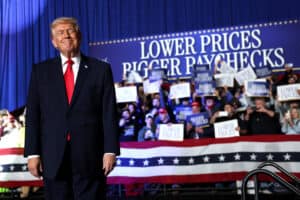The Bill was introduced by Republican representative Ronny Jackson, who took to social media on Tuesday to celebrate the milestone.

A Bill to review the bilateral relationship between the United States (US) and South Africa, and to impose sanctions on government and ANC officials, has made significant progress.
The US-South Africa Bilateral Relations Review Act of 2025 (H.R.2633) was introduced in April and this week moved through US Congress’ foreign affairs committee with minor amendments.
This paves the way for the Bill to be debated and voted upon.
It was introduced by Republican representative Ronny Jackson, who took to social media on Tuesday to celebrate the milestone.
“Today, my Bill to fully review America’s relationship with South Africa and give President Trump the tools necessary to hold their corrupt government accountable passed through committee. The days of allowing our so-called ‘allies’ to walk all over us are over!”
Afriforum welcomes the move
In reaction, head of public relations at AfriForum, Ernst van Zyl, said the ANC’s “years of reckless and extremist diplomatic actions and rhetoric are now bearing bitter fruit”.
“AfriForum maintains that ordinary citizens of the country should not be punished for the extremism and corruption of politicians.
“AfriForum has never advocated for sanctions that target South Africa as a whole. Therefore, the introduction of targeted sanctions against these politicians will be a welcome development,” Van Zyl added.
ALSO READ: Is Trump about to slap sanctions on SA for misguided ‘white genocide?’
ANC not afraid of sanctions
The ANC has been defiant in the face of possible sanctions, with deputy secretary-general Nomvula Mokonyane saying the party would “sacrifice” if needed.
“We must protect who we are, what we seek to do and what we stand for as a country.
“We hear there is a good lobby around sanctions, but throughout our struggle, we know that leaders and members of the liberation movement had to sacrifice.
“Even in this particular period, we will continue to pay the price of standing for justice, humanity, equality and respect for the rule of law.”
She said that ANC allies, including Cuba, had been sanctioned by the US, but the party would not compromise.
“We will continue to speak for ourselves. But who are we when it was just a few years ago that Nelson Mandela was removed from the list of terrorists? The struggle continues.”
ALSO READ: ‘Right-wing nexus’: Presidency cautions South Africans against the DA [VIDEO]
A frosty relationship
SA President Cyril Ramaphosa met with his US counterpart Donald Trump in May amid a rapidly deteriorating relationship between the two countries.
Since Trump took office at the start of the year, the US has cancelled aid funding to South Africa, issued an executive order against the country alleging human rights violations, offered refugee status to white “farmers”, and expelled former Ambassador Ebrahim Rasool for his criticism of the Trump administration.
Rasool was not replaced, and it was recently revealed that the US had, several months ago, rejected the South African government’s appointment of Mcebisi Jonas as a special envoy to its country.
The Presidency said while Jonas, as special envoy, does not present diplomatic credentials to host countries in the way designated heads of mission or other diplomats do, he had helped facilitate trade and international relations efforts “to reset diplomatic relations and all areas of cooperation between South Africa and the United States”.
“President Ramaphosa has not had a need for Mr Jonas to visit the United States on urgent business,” it added.
ALSO READ: Ramaphosa ‘satisfied’ with Mcebisi Jonas’s work despite being snubbed by Trump
Tariffs
Earlier this month, the US hit South Africa with 30% tariffs “on any and all South African products sent into the United States”.
The tariff will take effect on 1 August.
In a letter to Ramaphosa, Trump claimed the steep tariffs were necessary to correct what he claimed was a persistent trade deficit between the two countries.
However, this was challenged by Ramaphosa, who said the decision was based on a flawed interpretation of trade data.
Additional reporting by Enkosi Selane






